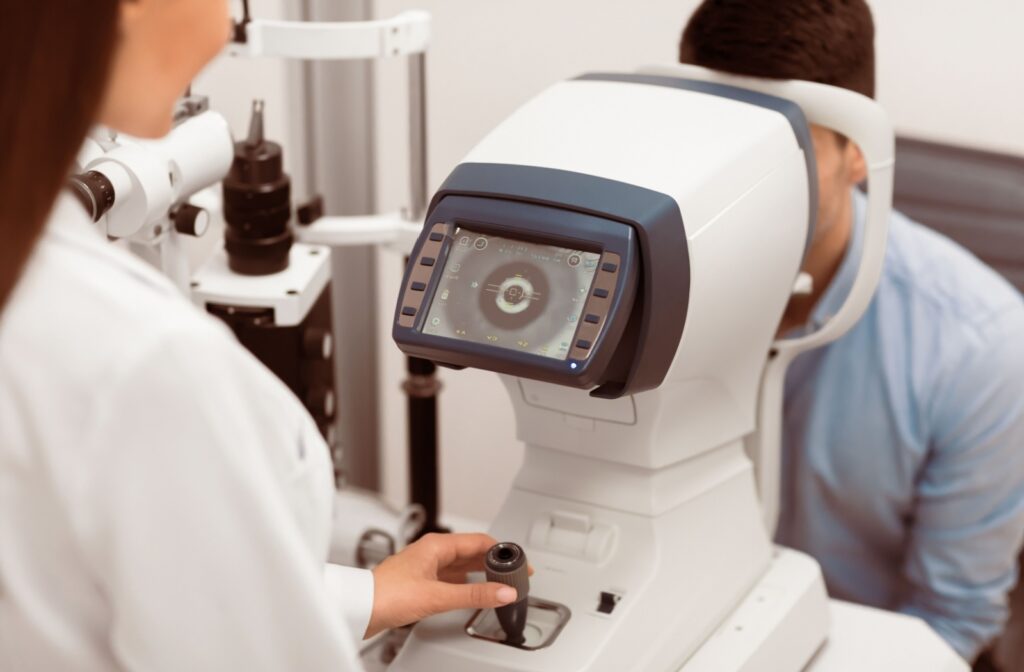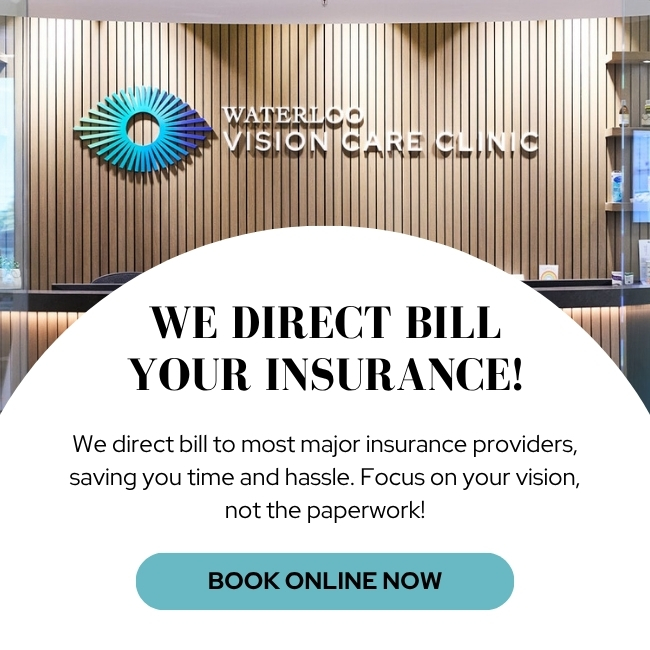Maintaining clear vision and healthy eyes is a huge part of staying connected with the world around you. From reading the fine print on a document to safely driving at night, your eyesight plays an important role in daily life.
Eye exams help keep your vision clear, but that’s just the beginning. They can also detect many of the eye conditions that often first present without symptoms, including cataracts, glaucoma, and macular degeneration.
The average cost of an eye exam in Ontario depends on various factors such as the type of exam, the technology used, and individual patient requirements. Costs can also vary based on the clinic, location, and your optometrist’s expertise.
Breaking Down Eye Exam Costs Across Ontario
Eye exam prices in Ontario vary according to the type and depth of the assessment.
The fees for an eye exam generally cover a thorough evaluation of eye health, vision acuity, and potential risk factors for eye conditions. There may be some additional fees based on whether you need specialized examinations, such as retinal imaging or optical coherence tomography (OCT).
Because prices can differ between practices, contact your optometrist to determine their rate and ask what’s included in their eye exams.
Does OHIP Cover Eye Exams?
While OHIP (Ontario Health Insurance Plan) provides coverage for many Ontarians, it’s limited to specific groups based on age and medical condition. These groups are:
- Children under 19: Covered for 1 eye exam per year, plus minor follow-ups as necessary.
- Seniors aged 65 and older: Covered for 1 comprehensive eye exam every 12 or 18 months (depending on eligible medical conditions), along with up to 2 additional minor assessments (certain restrictions apply).
- Adults aged 20–64 with qualifying medical conditions: OHIP covers 1 annual eye exam for people with eligible medical conditions, along with 2 follow-up assessments (certain restrictions apply).
Adults between 20 and 64 years old without eligible health conditions are required to cover the cost of eye exams out-of-pocket or through private insurance, as regular exams are not included in OHIP coverage.
Covering the Cost of Eye Exams with Insurance
For those not covered by OHIP, private insurance or workplace benefits may contribute to the cost of eye exams and additional testing. Many insurance plans offer partial or full coverage for routine eye assessments and related expenses. Here are some ways you can get the most out of these benefits:
- Verify coverage details: Before booking your eye exam, check your plan’s specific benefits, including how often coverage applies (e.g., annually or every 2 years). Watch for when your benefits refresh and whether any rollover into the next year. Try to use up all your benefits before you lose them.
- Look for direct billing: Some clinics directly bill your insurance provider, simplifying the payment process. Waterloo Vision Care Clinic provides direct billing to some insurance providers.
- Clarify additional coverage: If you have a condition like diabetes, your insurance may include specialized testing.
Understanding your insurance plan helps you save money while staying proactive about your eye health.

Factors That Can Influence Eye Exam Pricing
The cost of an eye exam can vary due to several factors related to the clinic and the specific patient’s needs. Common variables include:
- Optometrist’s expertise: Optometrists with extensive experience may charge higher fees.
- Technology used: Clinics that use advanced diagnostic tools and imaging technology may have slightly higher rates.
- Additional testing: Specialized exams, such as retinal imaging or OCT scans, can increase costs.
- Location of the clinic: Clinics in urban areas often charge more compared to those in smaller towns.
Make it a point to discuss pricing and potential additional fees with your optometrist ahead of your appointment to avoid any surprises and better understand your options.
Why Routine Eye Exams Are More Than Just a Checkup
An eye exam is far more than updating your prescription. It’s a vital tool for maintaining lifelong vision and early detection of potential health issues. Regular visits to the optometrist can help detect various eye diseases that can sneak under the radar, such as:
- Glaucoma: A condition that harms the optic nerve and can lead to vision loss without early symptoms.
- Cataracts: The natural clouding of the eye’s lens, which impacts vision quality.
- Diabetic retinopathy: A complication of diabetes that affects the retinal blood vessels, risking vision loss.
- Macular degeneration: A condition impacting central vision, making daily tasks like reading difficult.
- Systemic health conditions: High blood pressure, diabetes, and other systemic illnesses often present early signs in the eyes.
Early detection allows optometrists to recommend timely treatment and, in many cases, lifestyle changes to protect your vision and overall health.
What to Expect During an Eye Exam
If you’re visiting an optometrist for the first time, here’s what a typical assessment might include:
- Review of your vision history and current medications.
- A series of tests, such as visual acuity, a pressure test (tonometry) for glaucoma, and a retinal examination to screen for disease.
- Evaluation of binocular vision (eye teaming), eye movements and peripheral vision
You should bring along your most recent glasses, sunglasses and/or contact lenses, as well as any notes on recent symptoms, list of medications and family history of eye conditions.
Most eye exams take between 30 to 60 minutes, depending on what tests you need and whether additional imaging tests are necessary. Patients managing conditions such as diabetes or a history of glaucoma may need extended testing to monitor long-term eye health.
Your Vision Deserves Comprehensive Care
Eye exams are not merely a yearly checkbox; they’re your gateway to better health and sustained vision. They’re a proactive way for you to safeguard your and your family’s eye health. At Waterloo Vision Care Clinic, we combine personalized care with diagnostic technology to make every visit comprehensive and comfortable. Book your appointment today and discover eye care that prioritizes both your vision and peace of mind!




